Movies to Stream: Queer iconoclasts
Kicking off my Pride month series with an essential rebellious streak and a heaping spoonful of filth
In the spirit of spreading the queer gospel far and wide, my Pride Month columns will be free for everyone 🏳️🌈 If you like what you read, consider subscribing and supporting my work
There’s nothing wrong with wanting to be accepted. Many queer people, myself included, have strived for this at various levels for much of our lives.
But sometimes, I must say, it feels good to stand out. Grappling with queerness beyond mainstream assimilation is essential. We must show people who don’t accept us that not only are we not afraid, but that we are not going anywhere.
A common talking point for people like this (bigots, I mean) is usually something to the effect of, “I don’t care if you’re gay, but why do you have to rub our faces in it?” or “What you do behind closed doors is none of my business, just don’t make me look at it.”
Pride Month (also known as June) is meant to celebrate queer identity in its many forms, publicly. As these celebrations have gone more mainstream in the U.S. in the last 15 or so years, fissures have emerged. Now that more straight cis people are watching, there’s a push and pull over Pride and respectability.
To put it bluntly: I’m not dignifying that discussion here. Once you start policing one aspect of Pride (kink at these celebrations seems to be the debate de jour), it never ends.
This week, we’re looking at directors who are very much on that wavelength. These queer iconoclasts have created works that are confrontational, twisted, deeply personal, or some combination of the three.
(Unless otherwise noted, all movies are available to rent from Apple, Amazon, etc. in addition to the listed streaming services. But if you watch them and like them, I’d consider buying physical copies 😃)
Double Feature: The Bitter Tears of Petra von Kant (1972) and Fox and His Friends (1975)
Both films are streaming on The Criterion Channel and Max.
Starting at the end of the ‘60s, the German director Rainer Werner Fassbinder made over 40 films and TV shows in a 15-year period. Drugs may have been involved.
Two of his greatest works are masterful crystallizations of one his great themes: examining toxic power imbalances at the core of romances.
The Bitter Tears of Petra von Kant is a brutally emotional, gorgeously theatrical melodrama about fashion designer Petra’s (Margit Carstensen) obsessive attachment to a young woman (Hanna Schygulla).
As Peter Matthews writes in his Criterion essay, “Petra's sadomasochist ordeal was autobiographical and evidently therapeutic for Fassbinder. He admitted that his volatile affair with the actor Günther Kaufmann had brought him close to the edge. If so, Bitter Tears is an exorcism by ritual self-abasement.”
Fassbinder stars as well as writes and directs in his Fox and His Friends, his lightning rod 22nd film. He plays Franz, a carnival worker who wins the lottery only to be taken advantage of by a new, wealthier boyfriend and a gang of gay bourgeoisie leeches.
More detached than Petra von Kant, this film is Fassbinder’s cynical, exacting dissection of the German social order at the time. It is a tragedy stripped of empathy, at times funny, at times seething with anger.
Criticized at the time of its release for what some see as a derogatory view of gay life, I find the film holds up as a brutally exacting class critique. “Perhaps the question of whether its viperous superficiality is attributable specifically to homosexuality is ultimately less interesting than the way its gay men accept and enforce the class divisions of a larger culture that marginalizes and oppresses them,” Michael Koreskey writes.
Double Feature: Serial Mom (1994) and But I’m a Cheerleader (1999)
Serial Mom is streaming for free with ads on Tubi. But I’m a Cheerleader is streaming on Paramount+.
I don’t think I’d be able to live with myself if I didn’t include a John Waters film in a queer iconoclast column.
Serial Mom is, for my money, one of the funniest films ever made. Starring Kathleen Turner as a murderous Baltimore housewife, the movie finds Waters using the resources of a major studio to create a depraved suburban satire.
Turner’s Beverly Sutphin is a deranged upholder of prim and proper social norms. Not properly labeling your recycling is, to her, a capital offense. She is a dotting, obnoxiously chipper mother, though she and the movie’s sunny suburban surfaces conceal a sadistic streak that manifests through both harmless fun like prank calls and, uh, murder.
Serial Mom finds the King of Filth in a more commercial mode, Trojan horsing his penchant for loud and proud vulgarity (“Is this the cocksucker residence?”) into what, at a glance, feels like a fairly commercial release.
Mink Stole, one of Waters’ longtime muses, has supporting roles in both Serial Mom and the other movie in this pairing. She plays a homophobic mother who ships her daughter Megan (Natasha Lyonne) off to conversion therapy in Jamie Babbits’ uproarious first feature, But I’m a Cheerleader.
Babbits’ ruthlessly satirical depiction of this camp is a pink- and blue-pastel-tinged nightmare. But her movie also has a sweet side, which takes the form of a budding romance between Megan and another woman at the camp, Graham (Clea DuVall).
Other Movie Recommendations
O Fantasma (2000) - Streaming for free with ads on Tubi.
The films of João Pedro Rodrigues that I’ve seen are unapologetically kinky and confrontational. That includes his debut feature O Fantasma, about Sergio (Ricardo Meneses), a trash collector who dons a full-body rubber suit and roams Lisbon seeking anonymous gay sex.
The movie is a wild and confident exploration of desire and alienation, as shocking as it is intimate. As Sergio’s random hookups transition into an all-consuming obsession with another man, the movie is transformed into a tense, violent thriller. “O Fantasma isn’t a watershed, but it has no need to be: it’s the grimily gorgeous beginning to a career that has never had to justify itself under any redemptive banner of respectability,” Koresky writes.
Jubilee (1978)- Streaming on The Criterion Channel and Max.
This film is the first (and so far only) work of the legendary gay artist Derek Jarman that I’ve encountered.
While I look forward to exploring his other work, Jubilee gave me plenty to chew on. A DIY punk sci-fi odyssey that features time travel, jumpsuit-clad female warriors, and a chronically bed-ridden throuple, Jubilee feels vibrantly uncategorizable.
Its narrative begins with an angel taking Queen Elizabeth I hundreds of years into the future so she can see first-hand where her serene, buttoned-up realm ends up. However, the story falls welcomingly by the wayside in favor of sustaining a grimy, gay, dystopian vibe.
I know there are boundless directors and films I’m leaving out here (Pier Paolo Pasolini jumps immediately to mind), but it’s just the first week of my Pride series 😄
If you have a favorite queer film or filmmaker you’d like me to shout out in the coming weeks, shout them out in the comments!

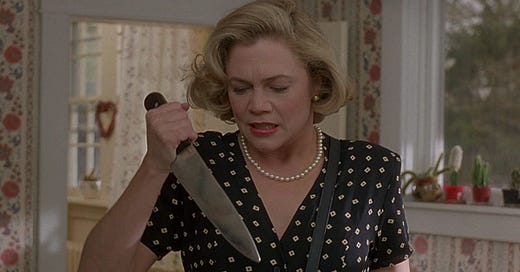


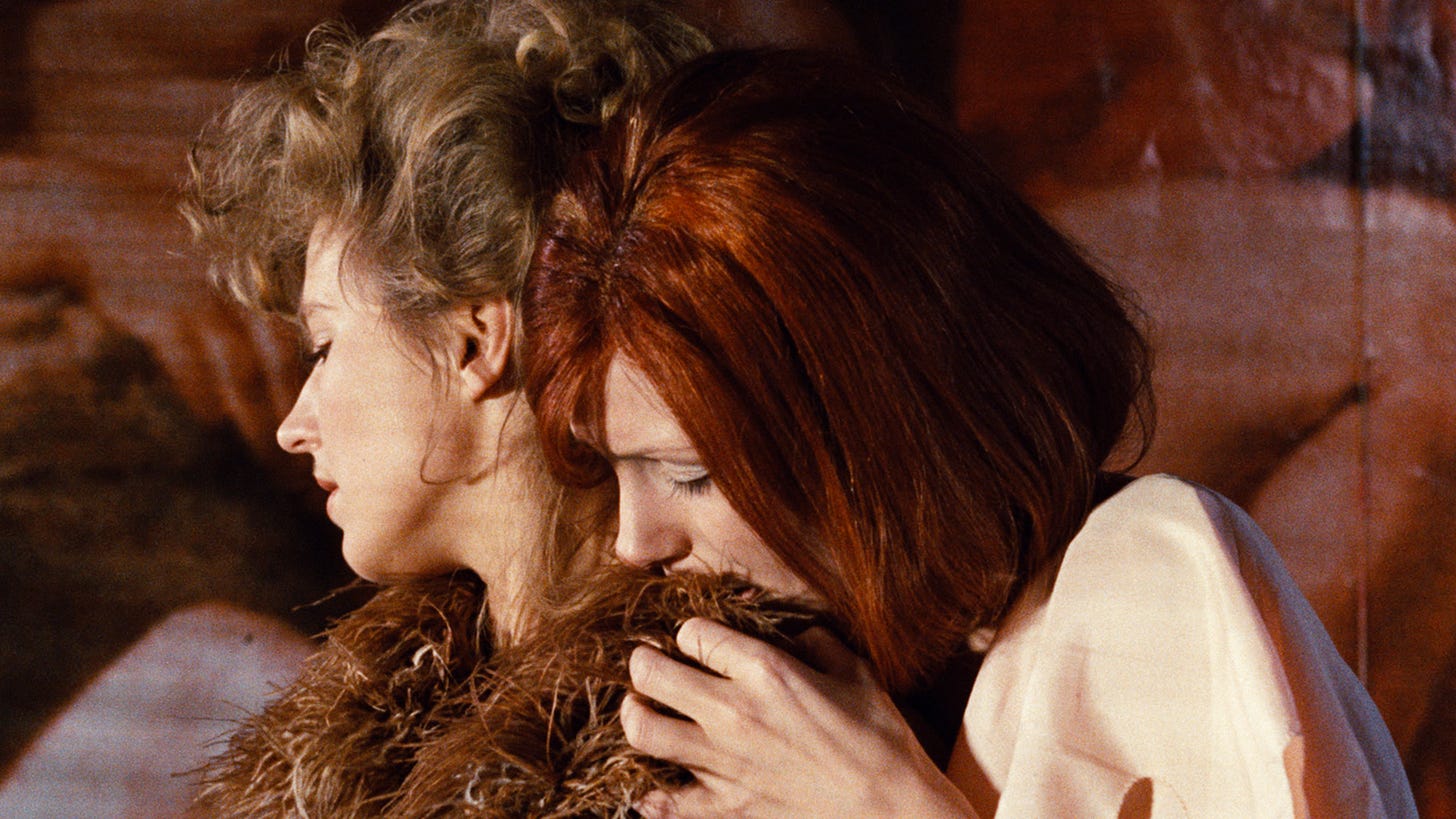
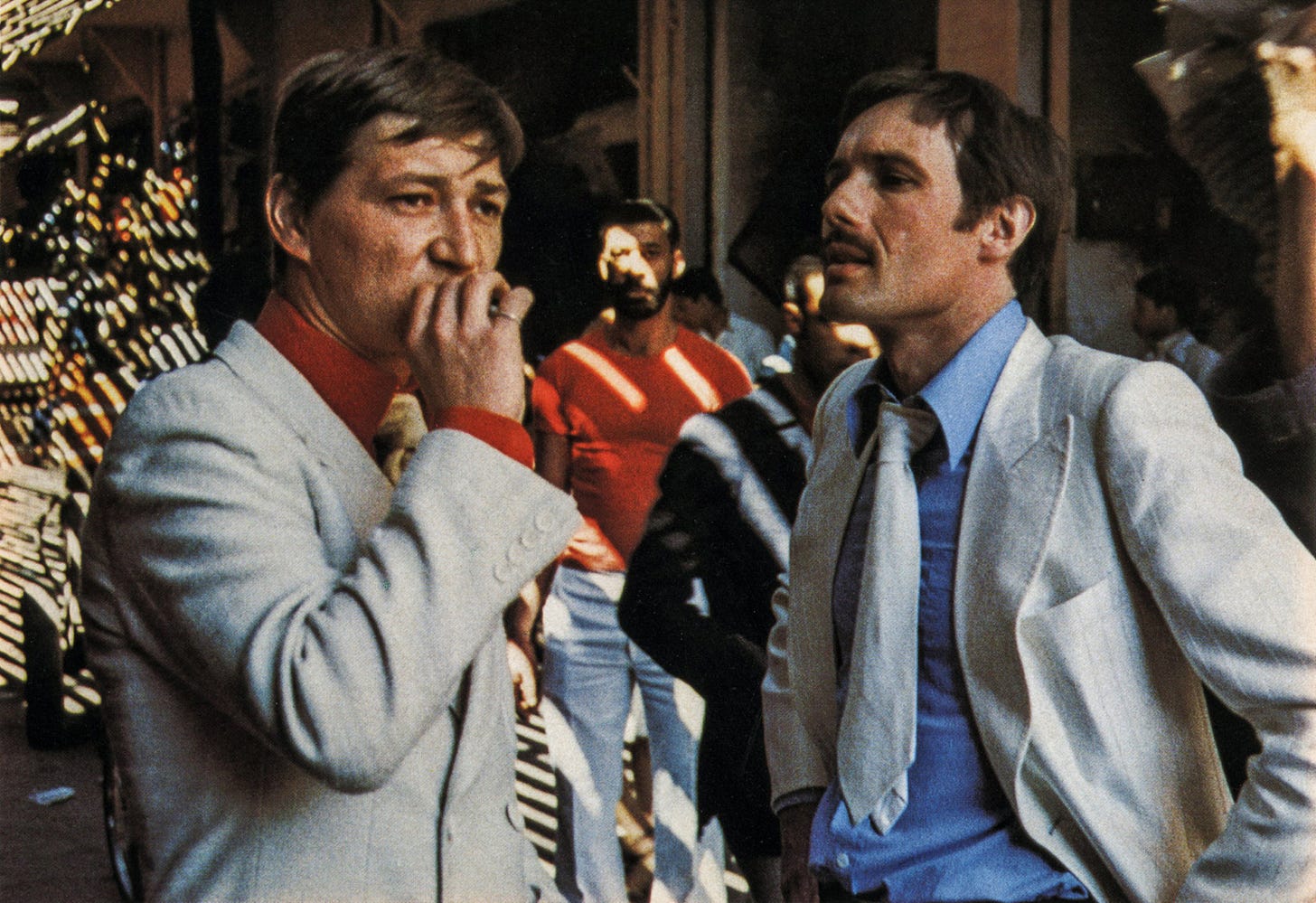

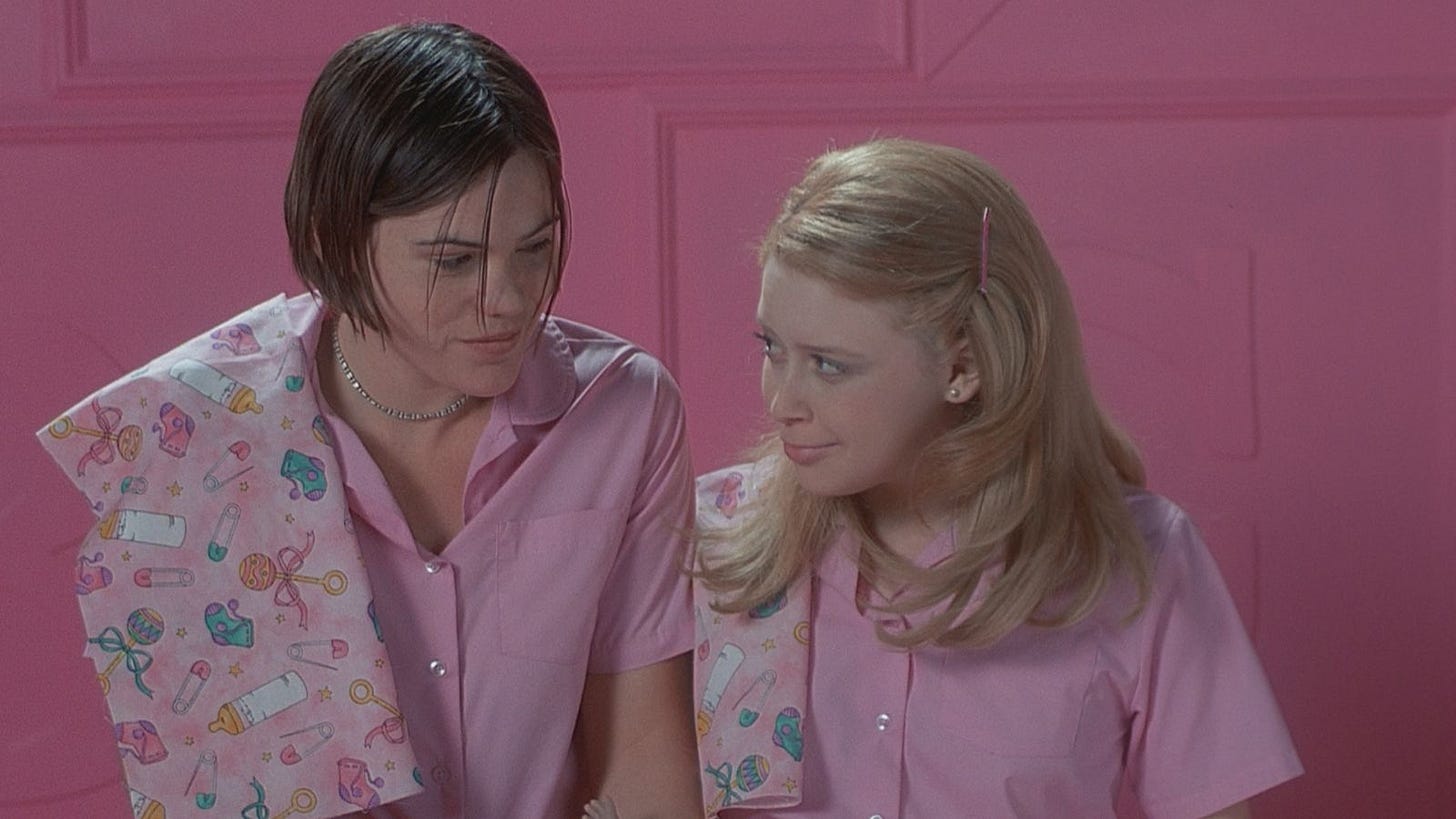
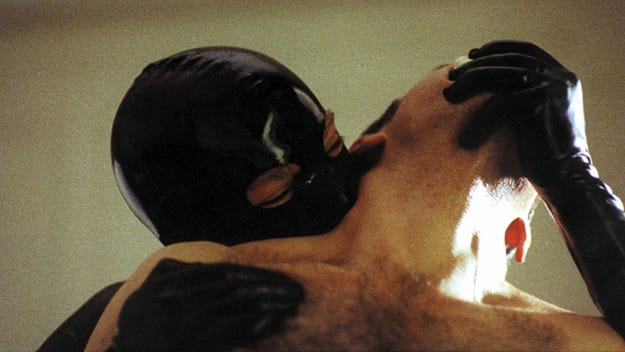
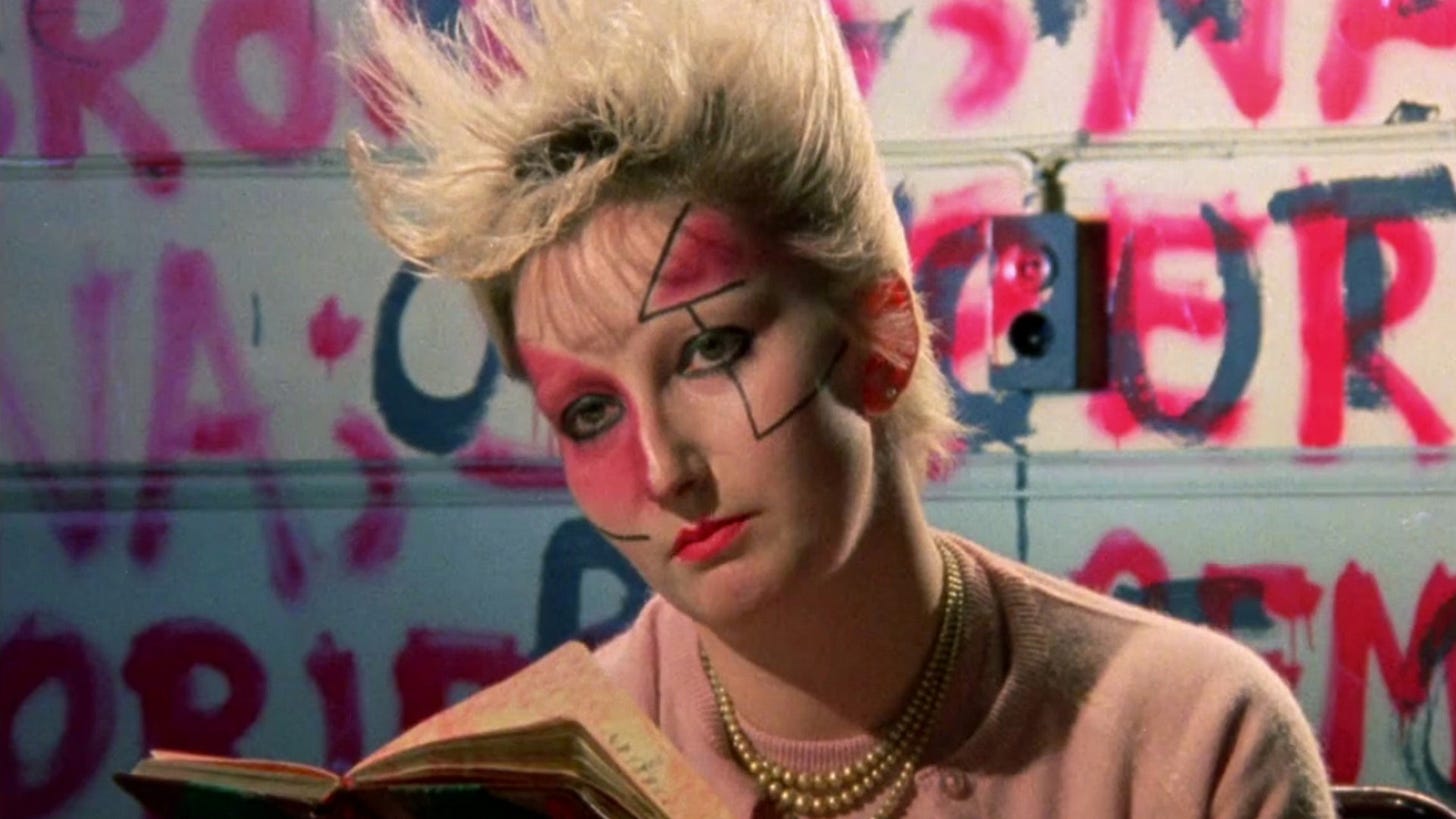

the new bev did that exact fassbinder double like five years ago and i and one of the obama daughters were in attendance :D